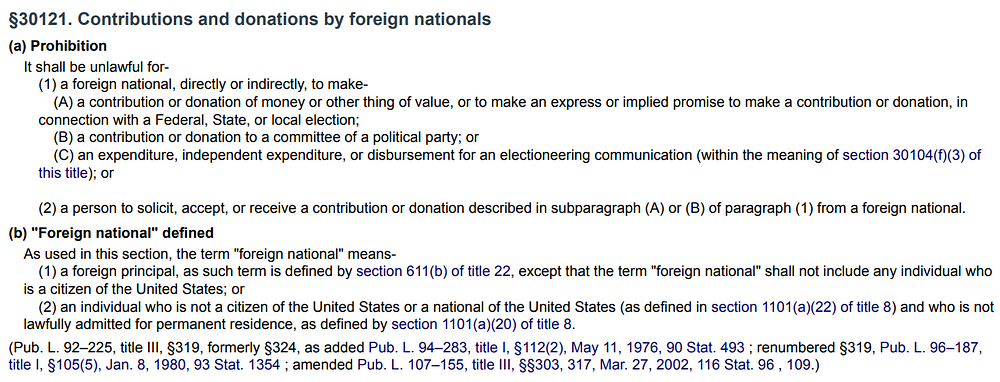By Kent R. Kroeger (Source: NuQum.com; June 20, 2019)
Another week, another media-generated faux controversy.
When asked by ABC’s George Stephanopoulos if he’d accept negative information about an opponent from a foreign source, President Donald Trump said, “I think you might want to listen, there isn’t anything wrong with listening. If somebody called from a country, Norway, [and said] ‘we have information on your opponent’ — oh, I think I’d want to hear it.”
The American political and media establishment immediately went mad.
Former Republican congressman David Jolly told MSNBC’s Brian Williams that Trump’s comment about potentially accepting from a foreign power political ‘dirt’ on a political opponent is an “impeachable moment.”
Congressional Democrats had their own response.
“I am headed to the Senate floor with (Virginia Senator) Mark Warner to try to pass legislation to make it a campaign’s legal duty to report to the FBI when a foreign power offers assistance,” Schumer tweeted soon after Trump’s comments became public. “There is no good reason for anyone to object.”
“Undemocratic. Unconscionable. Unbelievable,” complained New York Senator Chuck Schumer after the Warner election interference bill was blocked from a floor vote by Senate Majority Leader Mitch McConnell. “President Donald Trump is laying out the welcome wagon for Russia to interfere in our elections again.”
Some pundits didn’t need a new law to declare Trump the “traitor-in-chief.” Rachel Maddow…Don Lemon…Joe Scarborough…Jimmy Kimmel…The hosts of The View…In their opinions, Trump was already a law-breaker, but was now — ex post facto — admitting it. And he is prepared to do it again!
However, exactly what law would be broken if the president accepted dirt on an opponent from ‘somebody’ of foreign origin? [Who most likely would not identify themselves as a foreign intelligence agent, if they were one.]
The law most commonly cited is Title 52 U.S. Code § 30121 (Contributions and donations by foreign nationals), a conclusion supported by the current chair of the Federal Election Commission (FEC), Ellen L. Weintraub, who tweeted:
“Let me make something 100 percent clear to the American public and anyone running for public office: It is illegal for any person to solicit, accept, or receive anything of value from a foreign national in connection with a U.S. election (emphasis mine). This is not a novel concept. Electoral intervention from foreign governments has been considered unacceptable since the beginnings of our nation. Our Founding Fathers sounded the alarm about ‘foreign Interference, Intrigue, and Influence.’ They knew that when foreign governments seek to influence American politics, it is always to advance their own interests, not America’s. Anyone who solicits or accepts foreign assistance risks being on the wrong end of a federal investigation. Any political campaign that receives an offer of a prohibited donation from a foreign source should report that offer to the Federal Bureau of Investigation.”
It all hinges on one question within federal election law: Is information (‘dirt’) a thing of value?
The specific law being cited by Weintraub reads as follows:

Other former FEC officials corroborate Weintraub’s conclusion that political ‘dirt’ is a thing of value.
CNN contributor Larry Noble, the former general counsel of the Federal Election Commission (1987–2000), concluded about the 2016 meeting in Trump Tower between Trump campaign operatives and a Russian lawyer, “When Donald Trump Jr. replied he loved it to the offer of free Russian opposition research intended to help his father win the election, and then attended a meeting that included Jared Kushner and Paul Manafort to receive that information, he solicited an illegal contribution from a foreign government.”
According to Noble, Mueller didn’t indict anyone on this criminal offense for two reasons: (1) The “government could not prove Trump Jr., Kushner and Manafort were familiar with the foreign-contribution ban or the application of federal law to the relevant factual context,” and (2) Mueller “believes the government might encounter difficulty in determining the value of a contribution that took the form of factual derogatory information.”
But Weintraub, a Democrat, and other former FEC officials offer an interpretation of 52 U.S. Code § 30121 that has not been tested by the higher courts, according to Robert Mueller III and his special investigatory team.
The Mueller Report (p. 195) addresses the issue directly, and it hardly supports the D.C. establishment take on the legality of obtaining pertinent campaign information from foreign sources:
…no judicial decision has treated the voluntary provision of uncompensated opposition research or similar information as a thing of value that could amount to a contribution under campaign-finance law.
Such an interpretation could have implications beyond the foreign-source ban, see 52 U.S.C. § 30116(a) (imposing monetary limits on campaign contributions), and raise First Amendment questions (emphasis mine). Those questions could be especially difficult where the information consisted simply of the recounting of historically accurate facts (again, emphasis mine). It is uncertain how courts would resolve those issues.
The second paragraph is remarkable as it is Mueller telling us that using foreign-sourced information in the context of a presidential campaign is most likely legal, as long as it is factually accurate or does not abridge a presidential campaign’s free speech rights.
Yes, presidential campaigns have free speech rights. In fact, the area where higher courts have been most consistent in interpreting the First Amendment is regarding political speech; in contrast to other legal questions surrounding speech and press freedoms.
“After a century of academic debate…the meanings of speech and press freedoms at the Founding remain remarkably hazy,” writes Jud Campbell, an assistant professor at the University of Richmond School of Law. “Most scholars view these freedoms as equivalent, together enshrining a freedom of expression. But others assert that the freedom of speech, unlike press freedom, emerged from the legislative privilege of speech and debate, thus providing more robust protection for political speech (emphasis mine).”
Where most scholars and courts agree, however, is that deliberate efforts to mislead the public does deserve punishment and it is here where the Trump campaign could have gone south of the law very fast. But in the 2016 election, Mueller found no evidence that the campaign distributed false information obtained from foreign actors. [Since when does Donald Trump need help from others to make stuff up?]
Mueller’s reluctance to indict Trump Jr., Kushner and Manafort pivoted, not on whether the foreign-sourced information they sought was a ‘thing of value’ and therefore in violation of 52 U.S. Code § 30121 as Noble asserts, but on whether there was a reasonable expectation that the Russian lawyer in the Trump Tower meeting had factual information concerning Hillary Clinton.
If a presidential candidate breaks the law or engages in unethical behavior outside U.S. borders (which is exactly what much of the Steele dossier asserts about Trump), it serves the public interest to include this information in the public debate, regardless of its source. A presidential campaign can’t steal such information, or aid and abet in the theft, but receiving it is most likely not a violation of any U.S. federal law — which is why Senator Warner’s bill would make it a criminal act if an attempted exchange of information from a foreign actor is not reported to the FBI.
Ironically, none other than Hillary Clinton offers support for the legality of using foreign-sourced information as part of a campaign’s opposition research activities.
“It happens in a campaign where you get information that may or may not be useful, and you try to make sure anything you put out in the public arena is accurate,” Hillary Clinton told The Daily Show’s Trevor Noah in November 2017. “So, this (Steele dossier) didn’t come out until after the election and its still being evaluated. When Trump got the nomination for the Republican Party, the people (compiling the Steele dossier) came to my campaign lawyer and said, ‘Would you like us to continue it?’ and he said, ‘Yes.’ He’s an experienced lawyer. He knows what the law is. He knows what opposition research is.”
The Clinton campaign lawyer’s interpretation of federal election law isn’t a legal sleight of hand or exploiting a loophole in the rules guiding political campaigns. Americans have the right to know if their political candidates have engaged in illegal or unethical behavior.
We already have a reason for journalists and the 2020 Trump campaign to send investigators to Ukraine and China in pursuit of a story that so far has received little attention from the mainstream media. In a June 3 editorial for The Hill, John Solomon reported that Hunter Biden, former Vice President Joe Biden’s son, was paid upwards of $166,000 per month to sit on the board of Burisma, an energy company, from spring 2014 through fall 2015. This happened to be at the same time Vice President Joe Biden allegedly directed $1.8 billion in aid money to Ukraine on the condition that the Ukrainian President Petro Poroshenko fire Prosecutor General Viktor Shokin, who was investigating Burisma at the time. Hunter Biden also procured similarly lucrative deals with the government for China while his dad was vice president.
This may have all been legal and the U.S. Justice Department has not opened a new investigation into this matter. But that should not rule out the American people gaining a full understanding of the Biden family’s financial connections to the Ukraine and China. We are owed that information. Our democracy is stronger by learning as much as possible regarding Biden’s ethical standards.
There was a time when journalists actively investigated the ethics of presidential candidates and other political elites — even going abroad if necessary. Those days, however, seem to be vanishing (if not completely gone).
Still, political campaigns, journalists, and all U.S. citizens have the constitutionally protected right to legally engage in information-seeking in the their exercise of free speech.
Who most opposes the right of Americans to seek and publicize such ‘dirt’ on politicians? Politicians, of course! And working hardest to tear down these rights, at least for now, are the Democrats.
I care little about the day-to-day partisan squabbling that defines the our current American political system. I do care about whether we live in a free country and rolling back our constitutional freedoms in the cause of undermining the Trump presidency is not worth it.
It is unfortunate that the Democrats can’t see the bigger picture at the moment.
- K.R.K.
For comments and questions, you can contact me at: kroeger98@yahoo.com
